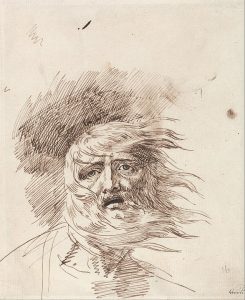by Rosemary Gould, leading And Take Upon Us the Mystery of Things: The Poetry of King Lear at Toronto Pursuits 2020

by George Romney
When I was in graduate school, I had the great privilege of teaching as an assistant to the extraordinary Shakespeare scholar, Arthur Kirsch. When I listened to his lecture on King Lear, I felt transported by the brilliance of his explanation of the value of the play. He argued that Lear’s bleak journey helps us face our own mortality, which seemed, in a subtle way, to change my relationship to my own life. I was young, but I knew I was hearing something that would continue to nourish my spirit for a long time afterwards.
When the lecture ended I turned to the undergraduate woman next to me to share the wonder I felt, but before I could say anything she grimaced and said, “Well, that was gloomy.”
‘Twas ever thus.
King Lear is a story of the worst of times with no best of times to balance it. Not only is the tragic hero destroyed, but his family, his nation, and it seems, even the natural world and the future of his people will be ruined by his fall. Why should we have to face such unalleviated suffering? Such hopelessness? People have often rejected it on those grounds, and they still do.
The play is believed to have been performed only twice during Shakespeare’s lifetime, and both performances occurred in 1606—in other words, it flopped. During the Restoration it was famously rewritten by Nahum Tate so that it conformed to enlightenment ideas about poetic justice and romance. The fool does not appear; Lear and Cordelia live; Cordelia and Edgar end up married.

As late as the Romantic period, Charles Lamb wrote that the true Lear “is essentially impossible to be represented on the stage.” In 1838, more than two centuries after it was written, London audiences saw King Lear in its original form, and, as the story goes, they were finally ready for it. Theater was changed forever.
This is the conventional narrative about the play’s history. It seems that people couldn’t bear the deaths of Lear and Cordelia until humanity matured a little more.
Which begs the question: why was it impossible? We know what people said about why they hated seeing Lear and Cordelia die, but those explanations don’t really address the problem. After all, everyone important dies in many of Shakespeare’s tragedies. Why isn’t the ending of Romeo and Juliet or Hamlet unbearable? Macbeth has always been a popular tragedy and is surely just as full of horror and existential philosophy. Were London audiences really so much more squeamish in the 18th century than they were in the Victorian era?
But when you love the play, you understand why people can’t bear it. You think of a “mad” Lear, wearing a crown of flowers, saying to the blinded Gloucester, “If thou wilt weep my fortunes, take my eyes,” and you know that no other tragedy is quite like that.
In other words, it isn’t only the plot of Lear; it’s the poetry. We’re called by this play to feel more painful emotion than most literature ever manages to evoke. It’s almost a test of a person’s ability to feel compassion and grief. How the poetry succeeds in making such excruciating demands on us (if we allow it to do so) is the great question I hope our seminar will address. Join me next summer in Toronto so that we can wonder at this achievement, “and take upon ourselves the mystery of things.”
— Rosemary
